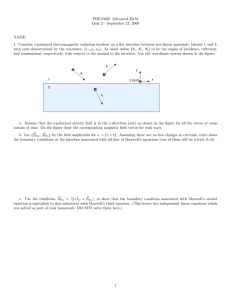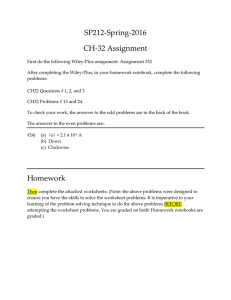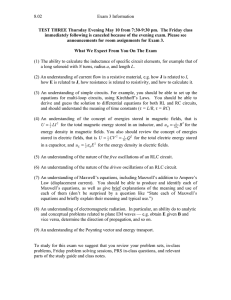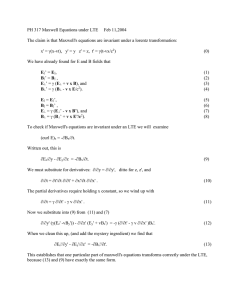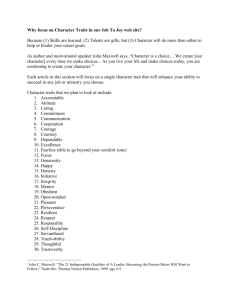Handout 10 - Maxwell`s equations
advertisement
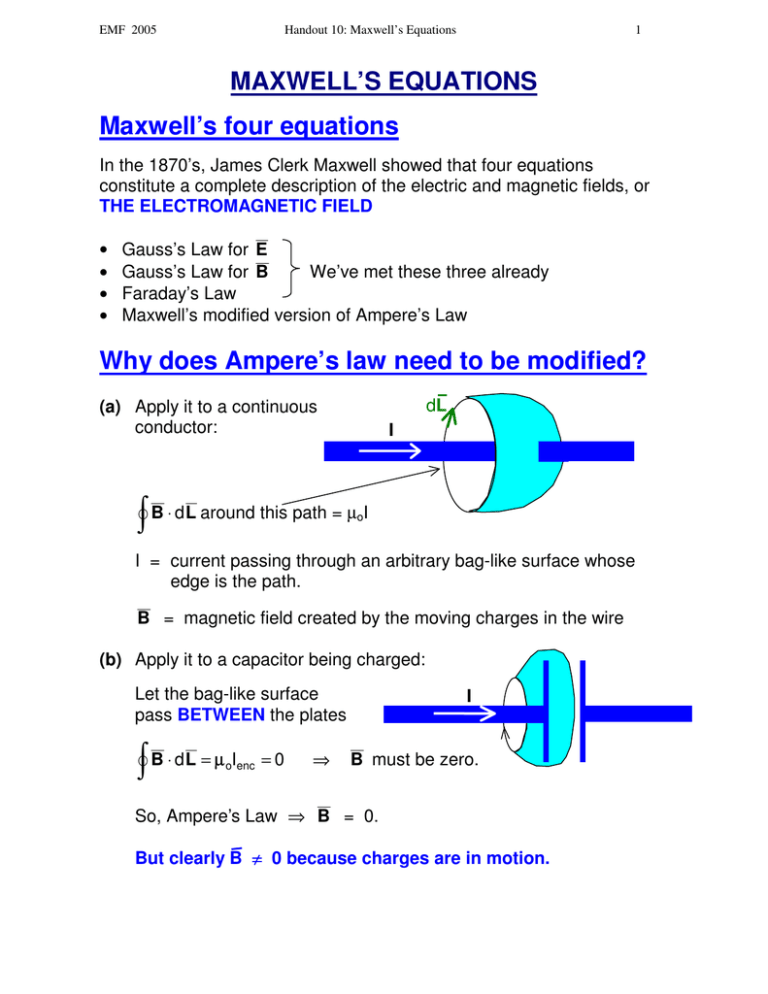
EMF 2005 Handout 10: Maxwell’s Equations 1 MAXWELL’S EQUATIONS Maxwell’s four equations In the 1870’s, James Clerk Maxwell showed that four equations constitute a complete description of the electric and magnetic fields, or THE ELECTROMAGNETIC FIELD • • • • Gauss’s Law for E Gauss’s Law for B We’ve met these three already Faraday’s Law Maxwell’s modified version of Ampere’s Law Why does Ampere’s law need to be modified? dL (a) Apply it to a continuous conductor: I ∫ B ⋅ dL around this path = µ I o I = current passing through an arbitrary bag-like surface whose edge is the path. B = magnetic field created by the moving charges in the wire (b) Apply it to a capacitor being charged: Let the bag-like surface pass BETWEEN the plates ∫ B ⋅ dL = µ I o enc =0 ⇒ I B must be zero. So, Ampere’s Law ⇒ B = 0. But clearly B ≠ 0 because charges are in motion. EMF 2005 Handout 10: Maxwell’s Equations 2 Maxwell’s modification The surface does not intercept any current, but it DOES intercept ELECTRIC FLUX How much flux is intercepted ? I Let Q = charge on capacitor Φ = ⇒ Q ⇒ εo dΦ I = ⇒ dt εo If we want ∫ E I = εo ∫ B ⋅ dL = µ I as for a straight wire, we must claim that o B ⋅ d L = µ oI + µ o ε o Term 1 dΦ dt MAXWELL’S 4th EQUATION Term 2 } Continuous wire : Term 1 = µoI Term 2 = 0 Capacitor dΦ dt : Term 1 = 0 Term 2 = µ o ε o OK dΦ = µ oI dt } OK Maxwell showed that this is a general relation which holds ALWAYS. Note: The modified Ampere’s Law can be written as ∫ B ⋅ d L = µ o (I + Id ) Id = ε o dΦ = DISPLACEMENT CURRENT dt EMF 2005 Handout 10: Maxwell’s Equations 3 What does this new version of Ampere’s law imply about the relationship between E and B ? Φ ≡ (E)(Area) i.e., If ⇒ if dΦ ≠ 0 dt then dE ≠ 0 dt dΦ represents a CHANGING ELECTRIC FIELD. dt dΦ ≠ 0 dt then ∫ B ⋅ dL ≠ 0 and therefore B ≠ 0. i.e., if there is a changing electric field, then the magnetic field cannot be zero or A CHANGING ELECTRIC FIELD PRODUCES A MAGNETIC FIELD Recall: Faraday’s Law: ∫ E ⋅ dL = − Changing B causes E dΨ dt This causes this Now, the modified version of Ampere’s Law implies that the reverse is also true: dΦ B ⋅ d L = µ oI + µ o ε o dt This causes this Changing E causes B ∫ EMF 2005 Handout 10: Maxwell’s Equations 4 A parallel plate capacitor, radius R, is connected to a source of alternating emf. Example: Alternating emf → alternating electric field What is the magnetic field R r E = Eosin(ωt) (i) Inside the capacitor (r < R) ? (i) Outside the capacitor (r > R) ? x x x x x x x x x x x x xr x x E (inwards) x x x E SIDE VIEW TOP VIEW The current flowing across the capacitor, I = 0 (plates are separated by a vacuum or insulator). (i) r < R: Symmetry ⇒ the magnetic field has the same magnitude and direction at all points on the dotted circle of radius r Direction of B will be tangential because the field is associated with current flowing O to the plane of the path. Apply modified Ampere’s Law to the circular path: Integrate B ⋅ d L around the path. d L is parallel to B everywhere along the path, And B is also the same all around the path. 2 πr So ∫ B ⋅ dL = ∫ BdL 0 2 πr ∫ = B dL = B(2πr ) 0 r B dL r B EMF 2005 Handout 10: Maxwell’s Equations 5 The electric flux through the path is Φ = (Field)(Area) = Eosin(ωt)πr2 d( πr 2Eo sin(ωt )) dΦ µ oI + µ o ε o = 0 + µoεo dt dt So 2πrB = πr2µoεoωEocos(ωt) ⇒ B( t ) = 1 µ o ε orωE o cos(ωt ) 2 or B(t) = Bocos(ωt) (i) r > R: The same analysis applies except that Φ = πR2Eosin(ωt) (no contribution from the area outside R) 1 µ o ε oR 2 ω E o B( t ) = cos(ωt ) 2 r ⇒ Sketch of the amplitude of the magnetic field vs. radius: B 1 µ o ε oRωE o 2 B∝r B ∝ 1/r R r EMF 2005 Handout 10: Maxwell’s Equations 6 Summary of Maxwell’s Equations (in integral form) Q enclosed εo 1 ∫ 2 ∫ B ⋅ dA = 0 3 ∫ E ⋅ dL = − 4 ∫ B ⋅ d L = µ oI + µ o ε o NB: E ⋅ dA = Gauss’s Law for the Electric Field Gauss’s Law for the Magnetic Field dΨ dt Faraday’s Law dΦ dt Maxwell’s modification of Ampere’s Law 3 ⇒ Changing B generates E 4 ⇒ Changing E generates B Changing B → changing E ⇒ OSCILLATION OF ENERGY BETWEEN THE ELECTRIC AND MAGNETIC FIELDS In fact, Maxwell’s equations imply the existence of ELECTROMAGNETIC WAVES
